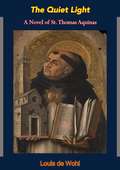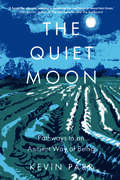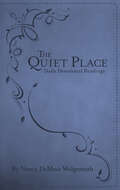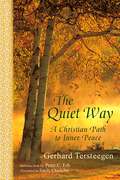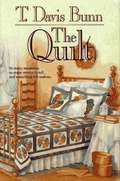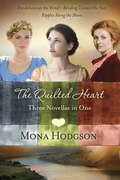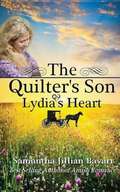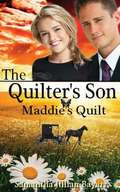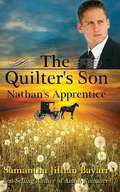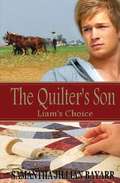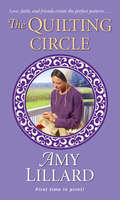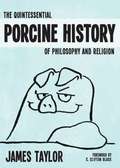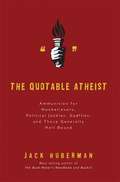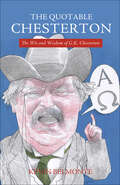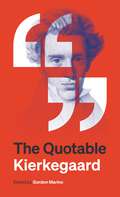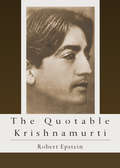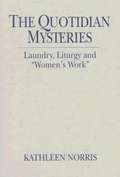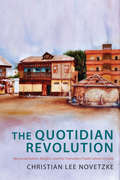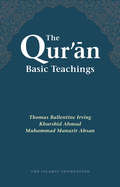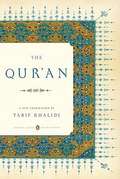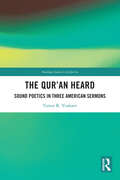- Table View
- List View
The Quiet Light
by Louis De WohlThe Quiet Light is one in a series of books by Louis de Wohl dealing with loves of various saints. This book covers the life and times of St Thomas Aquinas, a Dominican monk and philosopher. Thomas Aquinas is well known as scholastic philosopher and is the author of the Summa Theologica. Easy read and quite interesting.
The Quiet Light: A Novel of St. Thomas Aquinas
by Louis WohlThe famous novelist Louis de Wohl presents a stimulating historical novel about the great St. Thomas Aquinas, set against the violent background of the Italy of the Crusades. He tells the intriguing story of St. Thomas who—by taking a vow of poverty and joining the Dominicans—defied his illustrious, prominent family’s ambition for him to have great power in the Church.The battles and Crusades of the 13th century and the ruthlessness of the excommunicated Emperor Frederick II play a big part in the story, but it is Thomas of Aquino who dominates this book. De Wohl succeeds notably in portraying the exceptional quality of this man, a fusion of mighty intellect and childlike simplicity. A pupil of St. Albert the Great, the humble Thomas—through an intense life of study, writing, prayer, preaching and contemplation—ironically rose to become the influential figure of his age, and he later was proclaimed by the Church as the Angelic Doctor.As in all of his novels about great saints of the church, Louis de Wohl weaves an intricate colorful tapestry of love, violence and piety to bring to life a tremendous historical figure and the fascinating period in which he lived.Louis de Wohl was a distinguished and internationally respected Catholic writer whose books on saints have been best-sellers worldwide. Other available titles include Lay Siege to Heaven, Set All Afire and Citadel of God. Sixteen of his books were made into films.
The Quiet Moon: Pathways to an Ancient Way of Being
by Kevin ParrThe ancient Celts lived by and worshipped the moon. While modern, digital life is often at odds with nature – rubbing against it rather than working in harmony with it – is there something to be said for embracing this ancient way of being and reconnecting to the moon’s natural calendar?*January’s Quiet Moon reflects an air of melancholy, illuminating a midwinter of quiet menace; it was the time of the Dark Days for the ancient Celts, when the natural world balanced on a knife edge. By May, the Bright Moon brings happiness as time slows, mayflies cloud and elderflowers cascade. Nature approaches her peak during a summer of short nights and bright days – this was when the ancient Celts claimed their wives and celebrated Lugnasad. With the descent into winter comes the sadness of December’s Cold Moon. Trees stand bare and creatures shiver their way to shelter as the Dark Days creep in once more and the cycle restarts.In The Quiet Moon, Kevin Parr discovers that a year of moons has much to teach us about how to live in the world that surrounds us – and how being more in tune to the rhythms of nature, even in the cold and dark, can help ease the suffering mind.
The Quiet Place: Daily Devotional Readings
by Nancy Leigh DeMossBestselling author Nancy Leigh DeMoss adapts the core themes of her teaching into a format her fans can enjoy daily: 366 portions of rich Bible study and practical applications.
The Quiet Place: Daily Devotional Readings
by Nancy Leigh DeMossBestselling author Nancy Leigh DeMoss adapts the core themes of her teaching into a format her fans can enjoy daily: 366 portions of rich Bible study and practical applications.
The Quiet Way: A Christian Path to Inner Peace
by Gerhard TersteegenThe profound spiritual counsel of the 18th century German Protestant lay theologian, pastor, and mystic Gerhard Tersteegen is presented in this volume in the form of short selections from 100 of his letters.
The Quilt
by T. Davis BunnThis is the story of Mary, an elderly grandmother whose gnarled, arthritic hands have a beauty all their own. They represent so many skills, so many memories, so many stories to be told. Anyone who had met Mary described her as beautiful--she had always been there to listen and comfort and encourage those who were in pain, those who had lost their way. And yet in the twilight of her days, Mary felt a gentle yearning in her heart, the whisper of a melody she strained to hear....There was something left undone. When Mary becomes convinced that the task still unfinished is to make one more very special quilt, with every stitch sewn in prayer and thankfulness, the impact on her family and the surrounding community cannot be contained. No one who gets involved with this quilting project will ever be quite the same again!
The Quilted Heart Omnibus
by Mona HodgsonLike a beautiful patchwork quilt, the three novellas in The Quilted Heart tell stories of lives stitched together with love and God's unending grace. Once a week, Elsa Brantenberg hosts the Saint Charles Quilting Circle at her farmhouse on the outskirts of the riverside town of St. Charles, Missouri. The ladies who gather there have all experienced heartache related to the intense hardships of the Civil War, and together, they are facing their painful circumstances with friendship and prayer. Can the tattered pieces of their hearts be stitched together by God's grace? Dandelions on the Wind When Maren Jensen took a job on Elsa Brantenberg's St. Charles, Missouri farm, she never expected to call the place her home. As she grows to love Mrs. Brantenberg and her granddaughter, Gabi, Maren is transformed from a lonely mail-order bride-without-a-groom to a beloved member of the Brantenberg household. But when Gabi's father, Rutherford "Wooly" Wainwright, returns to the farm unexpectedly, everything changes for Maren, and she feels compelled to find another job. Are her choices in obedience to God, or is she running from His plan? Bending Toward the Sun Dedicated to her education and to helping her father in his general store, Emilie Heinrich is convinced she doesn't have time for love. But when a childhood friend returns to St. Charles, Missouri, after serving in the Civil War, his smile and charm captures Emilie's eye and her heart. Will she be forced to choose between honoring her father and a future with a husband and family of her own? Ripples Along the Shore Change is brewing in St. Charles. A group of brave souls are preparing to head west on the Boone's Lick Wagon Train, led by the mysterious and handsome Garrett Cowlishaw, who served as a Confederate soldier in the war that killed Caroline's husband. Despite her dislike for him, Caroline is tempted to join the wagon train and start fresh somewhere new, but when Mr. Cowlishaw forbids her--a single woman--to travel with them, will one man's prejudice destroy Caroline's hope for a new future? Or will the ripples of God's love bring the answer she needs?
The Quilter's Scandalous Past: An Uplifting Inspirational Romance
by Patrice LewisTo make a deal… She must bury the past With her uncle&’s health declining, Esther Yoder wants nothing more than to sell his mercantile store. But what she doesn&’t count on is Joseph Kemp being the prospective buyer. He&’s the reason Esther fled her Amish community, and Esther fears her shameful past could threaten the sale. Can they learn to forgive each other…or will old guilt stand in the way of their future? From Love Inspired: Uplifting stories of faith, forgiveness and hope.
The Quilter's Son: Lydia's Heart (The Quilter's Son #2)
by Samantha BayarrAfter rejecting the baptism into the Amish faith, Lydia Yoder has spent the past year courting Englischer, Steven Miller. When a mistake from Steve's past threatens to prevent their wedding, Lydia begins to contemplate joining the Amish community she'd turned her back on. Will Lydia be able to look past a mistake her betrothed made in his youth and open her heart to forgiveness, or is her heart broken beyond repair?
The Quilter's Son: Maddie's Quilt (The Quilter's Son #4)
by Samantha BayarrBook Four in The Quilter's Son seriesMaddie Hayes comes home early from college after being forced to leave her cheerleading scholarship behind. When Anna learns Maddie's secret, she discovers they have more in common than she originally thought. Anna and Maddie become roommates until Anna unexpectedly moves out and leaves Nathan just days before their wedding. Will Nathan be able to put his own worries aside to help Maddie through her dilemma?Find out in this tale of lost and found love. . .
The Quilter's Son: Nathan's Apprentice (The Quilter's Son #3)
by Samantha BayarrNathan had steered his life in one direction since his youth: toward a future with Anna as his wife. But when his desires for an alternate future threaten that, he must choose the right path. Enter Maddie, the pretty cheerleader, who accompanies Nathan on a tour of the university they had both been accepted to, and his future path veers off into a direction that spins out of control. Can Nathan get back on the path toward his future with Anna, or is something else in store for him?
The Quilter’s Son: Liam’s Choice (The Quilter's Son #1)
by Samantha BayarrLiam Yoder has been leading a double life ever since his dad was killed in a buggy accident. Will a chance encounter with his mother cause him to rethink his decision to leave the Amish community behind? What about Lucy, the bakery owner he left behind when they were teenagers? Will she be able to convince Liam to change his mind?Find out in this tale of bittersweet love. . .
The Quilting Circle (A Wells Landing Romance #7)
by Amy LillardUnited by faith, and bonded by their quilting circle, the Amish women of Wells Landing, Oklahoma, are there for one another through all life’s joys and challenges . . . MORE THAN FRIENDSHIP Youngest quilter Clara Rose Yutzy is planning her wedding to her longtime beau—which is why she resolutely ignores newly warm feelings for her best friend, Obidiah. But Obie is certain God intends them to be together. With the Lord’s help, he’ll prove to Clara Rose how much he loves her . . . MORE THAN A PROMISE Mariana Miller prayed for a child throughout fifteen years of marriage. But now, newly widowed, Mariana discovers she’s pregnant—with twins! She’s more grateful than ever for her caring community—especially Reuben Weisel, her late husband’s business partner and best friend. Reuben’s quiet strength comforts her—until he proposes marriage . . . MORE THAN A MARRIAGE Tess Smiley is new to Wells Landing and newly married. But her marriage isn’t the harmonious union she envisioned. Tess loves Jacob with all her heart, but her heart tells her she must take a stand—and ask for support. Only then does Jacob see how he has hurt her. But is he too late? . . .
The Quintessential Porcine History of Philosophy and Religion
by James TaylorWith delightful disrespect and hilarious updated illustrations, the author takes you through the history of Western philosophy and religion. Beginning with classic Greek pigs, the author pokes good-natured fun as you learn the essentials of these most important thinkers and schools of thought. See a little band of Methodist pigs fleeing from the wrath to come, a Calvinist pig being saved because he is predestined to be among the elect, a Barthian Pig hearing a resounding “NO” from above, a Deconstuctionist pig interpreting a text, and many others.
The Quotable Atheist: Ammunition for Nonbelievers, Political Junkies, Gadflies, and Those Generally Hell-bound
by Jack HubermanSurprisingly, no book of quotations on God and religion by atheists and agnostics exists. Luckily, for the millions of American nonbelievers who have quietly stewed for years as the religious right made gains in politics and culture, the wait is over.
The Quotable Chesterton: The Wit and Wisdom of G. K. Chesterton
by Kevin BelmonteG. K. Chesterton was a literary giant of his age. With an exceptional intellect, he wrote about history, politics, economics, philosophy, social and literary criticism, and theology. He published essays, novels, biographies, short stories, and poetry, and the Christian classics Heretics, Orthodoxy, and The Everlasting Man, which C. S. Lewis credits as instrumental in his conversion to Christianity.With much of his finest material out of print or hard to find, modern readers have long needed a standard collection of his best thoughts. Kevin Belmonte’s The Quotable Chesterton brings them to you arranged alphabetically by topic, with complete original source documentation.There are entries from Adventure to Cheese, Politics to Émile Zola, interspersed with essays about Chesterton’s life and times. Hundreds of passages drawn from Chesterton’s fiction, poetry, essays, and other books showcase a man the New York Times hailed as a “brilliant English essayist” and George Bernard Shaw called a “colossal genius.”Endorsements:“There isn’t a writer who gets me pacing and smiling and thinking like G.K. Chesterton. His every paradigm shift is an adjustment to my mental compass, and so a gift.” —DONALD MILLER, author of the New York Times bestsellers A Million Miles in a Thousand Years and Blue Like Jazz“Over the years, I have delivered thousands of lectures, speeches, talks, and sermons; I have written hundreds of articles, essays, books, and reviews; it is an exceedingly rare occasion when any of them should fail to contain the words ‘Chesterton once said.’ Kevin Belmonte here reveals that fountain of wit, wisdom, and wonder, G.K. Chesterton, in all his irresistibly, irrepressibly, quotable splendor.”—GEORGE GRANT, Pastor, Parish Presbyterian Church, and Chancellor, New College Franklin
The Quotable Kierkegaard
by Søren KierkegaardThe most comprehensive and authoritative collection of Kierkegaard quotations ever published"Why I so much prefer autumn to spring is that in the autumn one looks at heaven—in the spring at the earth."—Søren KierkegaardThe father of existentialism, Søren Kierkegaard (1813-1855) was a philosopher who could write like an angel. With only a sentence or two, he could plumb the depths of the human spirit. In this collection of some 800 quotations, the reader will find dazzling bon mots next to words of life-changing power. Drawing from the authoritative Princeton editions of Kierkegaard's writings, this book presents a broad selection of his wit and wisdom, as well as a stimulating introduction to his life and work.Organized by topic, this volume covers notable Kierkegaardian concerns such as anxiety, despair, existence, irony, and the absurd, but also erotic love, the press, busyness, and the comic. Here readers will encounter both well-known quotations ("Life must be understood backward. But then one forgets the other principle, that it must be lived forward") and obscure ones ("Beware false prophets who come to you in wolves' clothing but inwardly are sheep—i.e., the phrasemongers"). Those who spend time in these pages will discover the writer who said, "my grief is my castle," but who also taught that "the best defense against hypocrisy is love."Illuminating and delightful, this engaging book also provides a substantial portrait of one of the most influential of modern thinkers.Gathers some 800 quotationsDrawn from the authoritative Princeton editions of Kierkegaard's writingsIncludes an introduction, a brief account and timeline of Kierkegaard's life, a guide to further reading, and an index
The Quotable Krishnamurti
by Robert EpsteinTruth is a pathless land; you cannot approach it by any religion. . . . My only concern is to set men absolutely free. So said Jiddu Krishnamurti, one of the most influential spiritual leaders of the twentieth century. Born in India in 1905, as a teenager he was groomed by Theosophists C. W. Leadbeater and Annie Besant to become the next World Teacher. Yet later he broke from his mentors, refusing to play the messiah. For decades he traveled the globe, urging his followers to pursue their own, individual freedom without dependence on any doctrine. Hence this book's guiding purpose. Author Robert Epstein culls key quotations from Krishnamurti's Commentaries on Living and other works. Conveniently organized from A to Z, topics range from acceptance and anger to consciousness, fear, fulfillment, God, hope, joy, love, nonviolence, reincarnation, relationship, self-understanding, sex, suffering, vegetarianism, war, and wisdom. "You are the world, and the world is you," said Krishnamurti. "If there is a radical transformation in the structure of an individual's psyche, it will affect the whole consciousness of man." This small jewel of a book contains enormous power to inspire readers to just such a change.
The Quotable Krishnamurti
by Robert EpsteinTruth is a pathless land; you cannot approach it by any religion. . . . My only concern is to set men absolutely free. So said Jiddu Krishnamurti, one of the most influential spiritual leaders of the twentieth century. Born in India in 1905, as a teenager he was groomed by Theosophists C. W. Leadbeater and Annie Besant to become the next World Teacher. Yet later he broke from his mentors, refusing to play the messiah. For decades he traveled the globe, urging his followers to pursue their own, individual freedom without dependence on any doctrine. Hence this book's guiding purpose. Author Robert Epstein culls key quotations from Krishnamurti's 'Commentaries on Living' and other works. Conveniently organized from A to Z, topics range from acceptance and anger to consciousness, fear, fulfillment, God, hope, joy, love, nonviolence, reincarnation, relationship, self-understanding, sex, suffering, vegetarianism, war, and wisdom. "You are the world, and the world is you," said Krishnamurti. "If there is a radical transformation in the structure of an individual's psyche, it will affect the whole consciousness of man." This small jewel of a book contains enormous power to inspire readers to just such a change.
The Quotidian Mysteries: Laundry, Liturgy and "Women's Work"
by Kathleen NorrisAuthor discusses the spiritual aspects of daily household chores, and the ramifications for women's spirituality.
The Quotidian Revolution: Vernacularization, Religion, and the Premodern Public Sphere in India
by Christian Lee NovetzkeIn thirteenth-century Maharashtra, a new vernacular literature emerged to challenge the hegemony of Sanskrit, a language largely restricted to men of high caste. In a vivid and accessible idiom, this new Marathi literature inaugurated a public debate over the ethics of social difference grounded in the idiom of everyday life. The arguments of vernacular intellectuals pushed the question of social inclusion into ever-wider social realms, spearheading the development of a nascent premodern public sphere that valorized the quotidian world in sociopolitical terms.The Quotidian Revolution examines this pivotal moment of vernacularization in Indian literature, religion, and public life by investigating courtly donative Marathi inscriptions alongside the first extant texts of Marathi literature: the Lilacaritra (1278) and the Jñanesvari (1290). Novetzke revisits the influence of Chakradhar (c. 1194), the founder of the Mahanubhav religion, and Jnandev (c. 1271), who became a major figure of the Varkari religion, to observe how these avant-garde and worldly elites pursued a radical intervention into the social questions and ethics of the age. Drawing on political anthropology and contemporary theories of social justice, religion, and the public sphere, The Quotidian Revolution explores the specific circumstances of this new discourse oriented around everyday life and its lasting legacy: widening the space of public debate in a way that presages key aspects of Indian modernity and democracy.
The Qur' n Basic Teachings
by Khurshid Ahmad Thomas Ballantine Irving Muhammad Manazir AhsanAn anthology of selections from the Qur'an in contemporary English on topics ranging from the story of Creation and the idea of God to politics and economics. Compiled by three scholars, including T. B. Irving, the first American to translate the Qur'an into English, with a helpful introduction, extensive glossary and an index of Qur'anic verses.
The Qur'an
by Tarif KhalidiA landmark new translation of the sacred text of Islam? in an elegant deluxe edition Literally ?the recitation,? The Qur?an is considered within the Muslim faith to be the infallible word of God. Tarif Khalidi, the foremost scholar of Islamic history and faith, provides a fresh English translation that captures the startling, exquisite poetry of one of the world?s most beloved religious texts. Retaining the structure and rhythms of the original Arabic, Khalidi enlivens the ancient teachings and prophetic narratives central to the Muslim faith and solidifies The Qur?an as a work of spiritual authority and breathtaking beauty. A landmark new translation of the sacred text of Islam? in an elegant deluxe edition Literally ?the recitat ion,? The Qur?an is considered within the Muslim faith to be the infallible word of God. Tarif Khalidi, the foremost scholar of Islamic history and faith, provides a fresh English translation that captures the startling, exquisite poetry of one of the world?s most beloved religious texts. Retaining the structure and rhythms of the original Arabic, Khalidi enlivens the ancient teachings and prophetic narratives central to the Muslim faith and solidifies The Qur?an as a work of spiritual authority and breathtaking beauty. .
The Qur'an Heard: Sound Poetics in Three American Sermons (Routledge Studies in the Qur'an)
by Timur R. YuskaevFor many Muslims, there is an inseparable connection between sound and meaning, particularly when it comes to Islamic verse and scripture. This provides fertile ground for a comparative study across traditions and forms. Timur Yuskaev offers a meditation on the Qur’an and human sensibilities, heard together, in American Muslim sermons. Foregrounding sound, poetry and music, it is a cultural anthropology of the Qur’an, carried out in conversation with colleagues in multiple disciplines, including Religions in America, Qur’anic, Islamic, Memory, Communication, and Sound Studies. The author draws upon the works of Mikhail Bakhtin, Charles Long, Mary Douglas and many others to hear mysticism in a homiletic symphony by Warith Deen Mohammed, to sense the experience of the covenant in a three-minute, ribbon-cutting speech by Aras Konjhodzic, and to appreciate the Qur’anic musicality of a down-to-earth interfaith address by Sarah Sayeed. A creative guide to an organic engagement with texts, this book will be of particular interest to those studying scriptures and the Qur’an.

